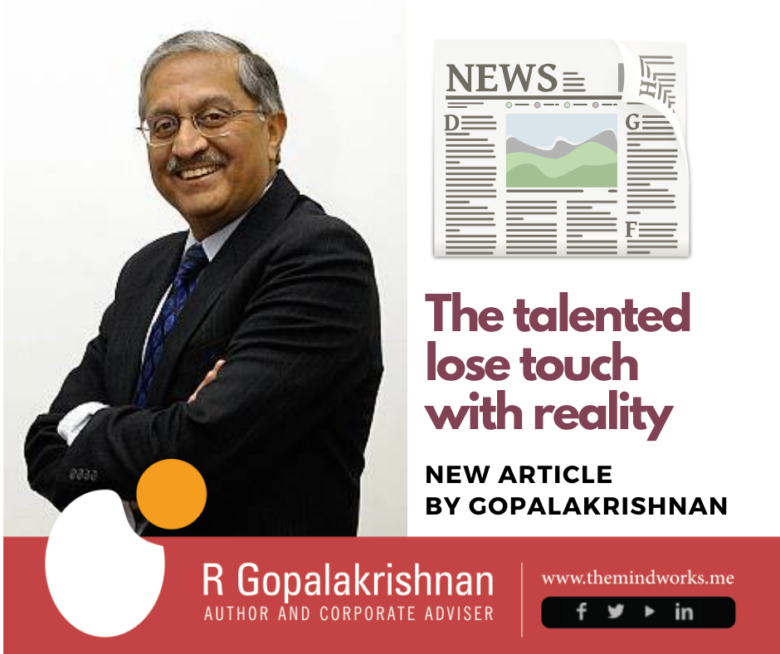R. Gopalakrishnan*
Email: rgopal@themindworks.me
(*The writer is an author and corporate advisor. He is a Distinguished Professor of IIT Kharagpur. He was a Director of Tata Sons and a Vice Chairman of Hindustan Unilever).
Indian business leaders tend to be opportunistic rather than strategic, perhaps a hangover from the license raj. Gurus exhort business leaders to view business through a long-term lens. Is business really a long game, and, anyway, what is a long game?
Professor James Carse of New York University wrote a book twenty-five years ago called Finite and Infinite Games, a rather arid and academic book. A more fluid book appeared last year–The Infinite Game (Simon Sinek, Penguin, 2019). James Carse states, “One does not win by being powerful; one wins to become powerful. If one has sufficient power to win before the game has begun, what follows is not a game at all.” As an illustration of winning to become powerful, think of NASA as America’s response to USSR’s launch of the Sputnik first.
Carse differentiates a finite player as being trained to anticipate every move of the competitor, to try to control the game towards a conclusion by preventing the competitor from altering the past, for example, football is a finite game. Infinite players play in the expectation of being surprised and, therefore, expect the game to continue for long with no winner or loser. A good marriage, for example, is an infinite game.
I offer three examples from the non-business domain of war to illustrate perceptions of infinite games.
Factually, the Americans won most battles and lost one soldier for every six Vietnamese soldiers killed. Then why is the US commonly thought to have lost in Vietnam? It could be because of the Tet offensive, which caught the Americans totally by surprise or because of the pictures of Americans being evacuated from Saigon rooftops as the North Vietnamese encircled, and later entered, Saigon.
Consider the tension between China and India, brewing for over sixty years. When addressing a dispute, India is metaphorically accustomed to playing chess, that is, to checkmate the opponent conclusively. China is accustomed to play xiang qi–a sort of Chinese chess—where players encircle each other endlessly until one is ready for capture. In xiang qi, the balance of forces shifts incrementally, giving a feeling of an endless process. In Henry Kissinger’s 2011 book, On China, the experienced diplomat refers to these two ways to play. Perhaps we are currently witnessing such a game in Ladakh.
Recall how the young Ottoman, Mehmet II, seized Constantinople on 29th May 1453 by encircling the city for fifty-seven days, cutting off supplies to the city. Constantine XI and his people faced starvation before finally succumbing. Constantinople, now Istanbul, had been besieged for centuries without success, and finally the city fell in 1453.
Vietnam, China and Ottoman illustrate the difference between their infinite game and the commonly experienced finite game.
In a TED talk, Simon Sinek offers a corporate example. On one of his visits to Microsoft, he observed that executives were obsessed with competition—analyze/criticize/decimate competition—resembling the contemporary play in Indian politics. Microsoft had gifted him a Zune HD, which, according to him, was an exceptional product. Soon after, he visited Apple and mentioned to some managers what an exceptional product Zune HD was. Apple executives thoughtfully responded, “Really? I reckon we have work to do.” He suggests that Microsoft was in a mindset of playing a finite game while Apple was playing an infinite game.
Hindustan Unilever launched a cream in 1975 to make Indians fair and lovely. The branding and product delivery were both exceptional. Deploying the Simon Sinek jargon, the company entered the five-step virtuous circle—(i) work for a cause, (ii) build trusting teams, (iii) study worthy rivals, (iv) retain existential flexibility and (v) display courage. The company built a Rs 4000 crores skincare brand by extending the product over the next forty-five years not only within India, but also in South Asia, Arab Regions, Malaysia and other markets. However, the company’s cause had to change because the world changed. Over time, the brand proposition became socially controversial because eulogizing fairness as a beauty attribute became passé. Existential flexibility and courage to change were demanded. The company responded vigorously. Time will tell whether the company will succeed, but one thing is for sure: the company is playing an infinite game.
Wise business leaders should reflect on how to play the infinite game.

